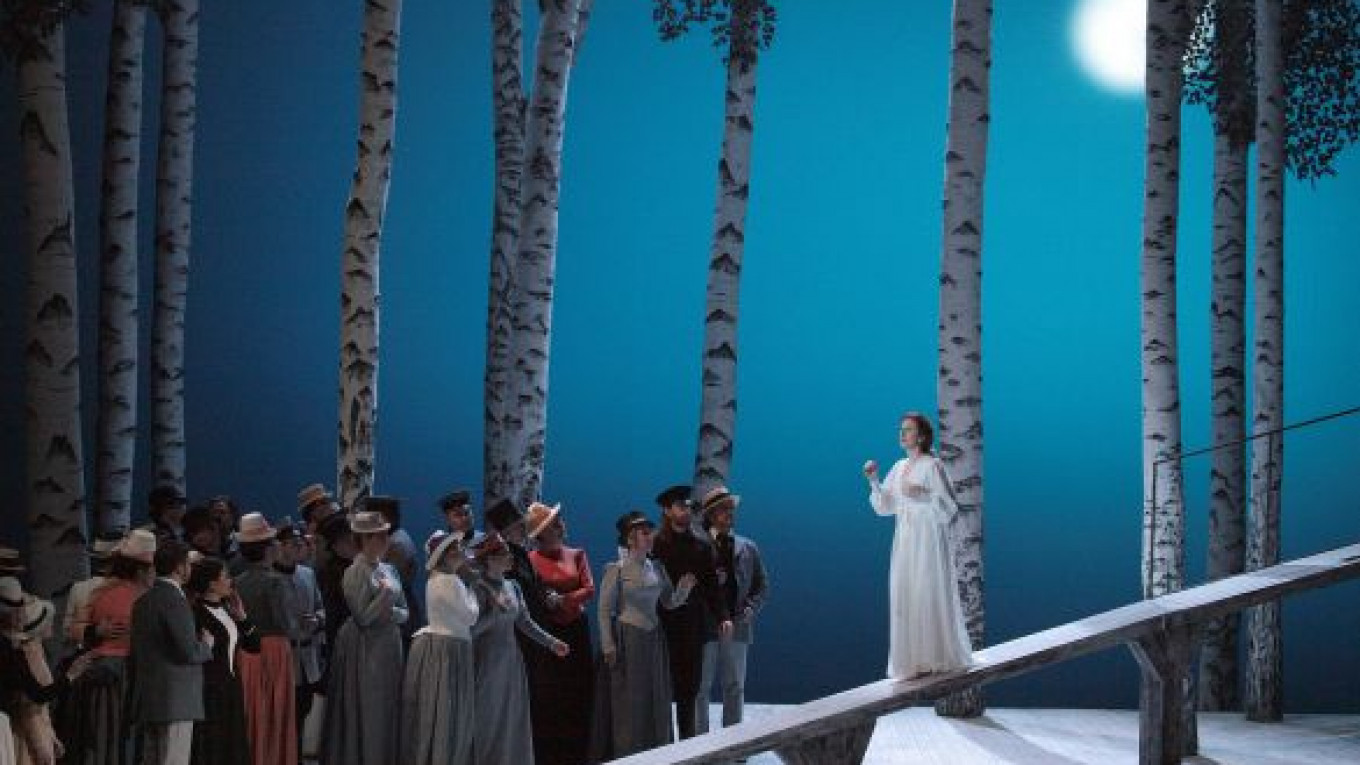Over the past few seasons, the Bolshoi Theater has made great strides in adopting practices that have long been followed in most of the world's big-league opera houses. In place of the inefficient system of randomly presenting the operas in repertoire, it has now largely moved to placing them in blocks of closely spaced performances. And it has increasingly reached outside its own roster of singers and conductors for guest artists from elsewhere.
While in the past the Bolshoi would normally have given a new production two or three performances before consigning it to the repertoire, with Vincenzo Bellini's "La sonnambula," which premiered last week, it is playing the work seven times over the space of 10 days. To perform it, the theater has enlisted a pair of singers, at least for the first of two casts, and a conductor who are among the world's leading exponents of the so-called bel canto operas that flourished in Italy during the first half of the 19th century.
The result, as imaginatively staged and decorated by veteran Italian director Pier Luigi Pizzi, is a production of which the Bolshoi can be justly proud.
In an interview published by The Moscow Times last week with American coloratura soprano Laura Claycomb, who sings the sleepwalking heroine in the first cast, I erred in stating that "La sonnambula" had appeared at the Bolshoi only once before, in 1837. More thorough investigation would have revealed that the theater gave the opera three revivals, the last in 1892, though in each case provocatively re-titling it, "The Bride Lunatic."
The rather lightweight story of the opera revolves around a young village couple, Amina and Elvino, and begins amid celebrations on the eve of their wedding. During the night, Amina sleepwalks her way into the room of an inn occupied by a mysterious stranger who turns out to be the long-disappeared local count.
She is discovered there asleep, and Elvino rejects her for her infidelity in favor of the inn-keeper, Lisa. But Amina eventually proves her innocence by sleepwalking again in full view of Elvino and the other villagers. And with that, she and Elvino are happily reunited.
Director Pizzi has very successfully moved the action of "La sonnambula" to the end of the 19th century and from Switzerland to a setting that is presumably Russia. The result has about it a distinct feeling of Chekhov, something that Pizzi readily acknowledges in the Bolshoi's program booklet.
"I believe that Bellini's world is similar in many ways to the world of Chekhov," he said. "It is incredibly poetic and always tinged with a soft melancholy, … and changes in emotional states are very subtle: One emotion conceals another, much is built on counterpoint — just as in Chekhov."
As with many other operas of its time, the score of "La sonnnambula" suffered numerous changes and distortions over the years. For the Bolshoi production, conductor Enrique Mazzola has worked from a recent critical edition of the score that returns to Bellini's original.
Mazzola also labored long and hard with the Bolshoi orchestra, or rather the two separate orchestras that the Bolshoi somewhat ridiculously imposed upon him, to draw them away from the style of playing they apply to most of the rest of the Bolshoi repertoire, particularly Russian operas, and into the gentler, more subtle musical world of Bellini.
Judging by what I heard at two performances, he managed the task with extraordinary success.
Laura Claycomb handled both the vocal acrobatics and the lyrical legato passages of Amina's part, with what seemed almost superhuman accuracy and crystal-clear tone, while her beautifully nuanced portrayal of the naive village maiden looked equally convincing in moments of both joy and sadness.
South African Colin Lee, as Elvino, proved a real phenomenon, one of that rare breed of lyric tenors who can reach, with seeming ease, to the very top notes of the tenor register. He sang elegantly throughout, especially so in his duets with Claycomb, and nicely played the bewildered village lad.
Excellent singing was also heard from the rest of the cast, which notably included another guest artist, bass Nikolai Didenko, who brought a finely tuned voice and appropriately lordly manner to the role of the Count, and the Bolshoi's own bright young coloratura, Anna Aglatova, in the part of Lisa.
Claycomb and Lee sing their final performance on Thursday, while the second cast, which I was unable to see, ends the current run on Friday. Neither of the two singers nor Mazzola will be returning for the July performances, but all will quite likely be on hand when "La sonnambula" subsequently returns early next year.
"La sonnambula" (Sonnambula) plays March 14-15, July 10-11 and July 13 at 7 p.m., and July 14 at 6 p.m., at the New Stage of the Bolshoi Theater, located at 1 Teatralnaya Ploshchad. Metro Teatralnaya. Phone: +7 495-455-5555. www.bolshoi.ru.
Contact the author at artsreporter@imedia.ru
A Message from The Moscow Times:
Dear readers,
We are facing unprecedented challenges. Russia's Prosecutor General's Office has designated The Moscow Times as an "undesirable" organization, criminalizing our work and putting our staff at risk of prosecution. This follows our earlier unjust labeling as a "foreign agent."
These actions are direct attempts to silence independent journalism in Russia. The authorities claim our work "discredits the decisions of the Russian leadership." We see things differently: we strive to provide accurate, unbiased reporting on Russia.
We, the journalists of The Moscow Times, refuse to be silenced. But to continue our work, we need your help.
Your support, no matter how small, makes a world of difference. If you can, please support us monthly starting from just $2. It's quick to set up, and every contribution makes a significant impact.
By supporting The Moscow Times, you're defending open, independent journalism in the face of repression. Thank you for standing with us.
Remind me later.






